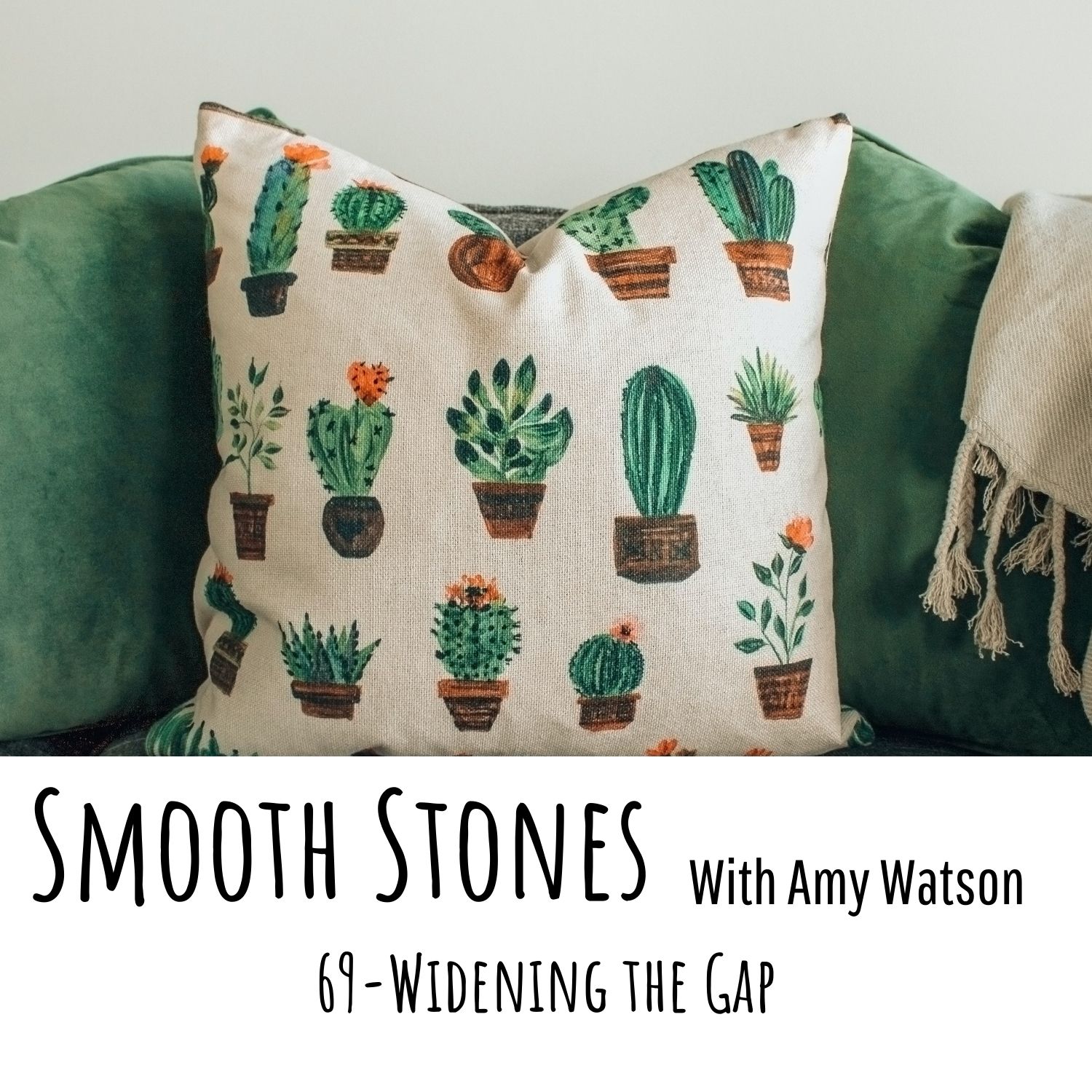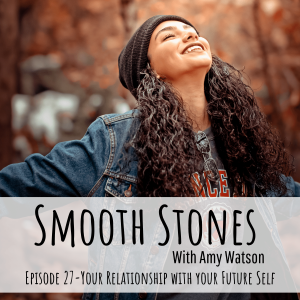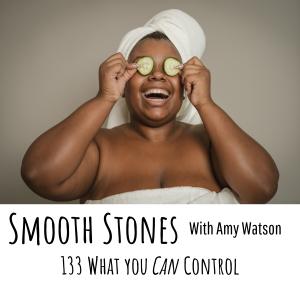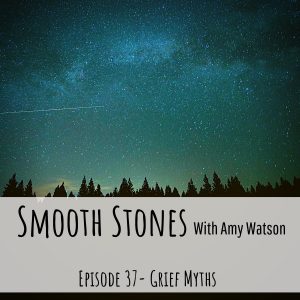Have you ever lost your temper or had a super strong reaction when someone pushed your buttons?
It doesn’t feel very good. And it seems like the only way to fix it is to change people or avoid them altogether.
But I’ve got some tips for how you can widen that gap between stimulus and response so you can be the person you want to be.
Review the podcast and win a free deck of Cards for Joy! After you have submitted a review, go to https://smoothstonescoaching.com/review to enter.
To schedule a free consult call, click HERE
Follow me on Instagram! @amy.smoothstonescoaching
Photo by Unsplash
Music by ZingDog on Pond5
Transcription
Welcome. I am so excited to be back in front of my microphone. October is almost over. It’s been quite a month. I’m wondering, how was it for you?
Did you celebrate your babies? Did you go to a walk? Did you light a candle on the 15th? I. What did you do? You gotta go over to Instagram. You can DM me anytime you want at Amy Smooth Stones Coaching. That’s mostly where I hang out, and I’d love to talk to you and hear what’s going on. So find me over there.
All right, I have something special I wanna tell you about. I wanted to do a little contest, a little giveaway, and it’s really, really simple. All you need to do is review this podcast, especially if you’re on Apple Podcasts. I actually don’t know how it works on other podcasts, but, um, whatever platform you’re on, if there’s a place to review it, go ahead and do that.
But if you could review the podcast and just say something that you’ve learned or something that you enjoy about it or how you feel after listening to an episode, I would really, really appreciate that because those reviews. Help other people see that this is a good podcast that they should listen to.
Then all you need to do is go to Smooth Stones Coaching slash Review and. Tell me that you have done a review. You have to enter just your name and your email address so I know that you did a review. You will be entered to win some cards for Joy. These are my cards that I have created with all of my best thoughts for life after loss on them, and they’re so, so pretty.
They have some beautiful artwork, some soothing beach scenes, and. These are just thoughts that will help you throughout your day and throughout the year, um, if you use this card deck. So you can win one of those for free if you review the podcast. I would truly appreciate it. So write a review. Then just go to smooth Stones coaching.com/review and just put in your name and email and we will know that you did a review and I hope that you will win and I might have some more surprises.
Who knows what I’m gonna decide to do. The other thing I wanna say is, you guys, it is almost. Like 2022. Maybe you’ve seen those little, uh, graphics going around social media talking about how many weeks it is till each holiday, but it’s crazy. Uh, if you have been dreading the holidays, if you’ve been struggling emotionally, if you have.
Special dates coming up that you are feeling like a little overwhelmed. I want you to come and talk to me. Go in the show notes. There’ll be a link to get on a consult call and I will help you. Why not use these last few weeks of the year to get some support to learn tools so that you can navigate this?
Without all the dread and the fear and the just emotions being all over the place and feeling overwhelmed, even without grief, the holidays can be a little bit of an emotional minefield, right? So definitely let’s get started. Say yes to you. Let’s do this. I hope to talk to you soon. Today I want to talk about increasing the gap in our reaction time.
And the reason I think this is so important, because a lot times the first thing I hear from people when they learn about thought work is that there isn’t a thought, right? Like something happens, our circumstance happens. There’s a, an emotional reaction and it comes out of nowhere and they’re, they don’t recognize that there is a thought.
They can’t figure out what the thought is, and it just seems to happen so fast. And a lot of times when we react that quickly, we are not at our best. So what I am referring to here is not if like, You see your favorite person and you get really excited and jump up and down, right? That that doesn’t usually bring up a problem in our life.
I’m talking about when we have maybe a more negative reaction or reaction that we don’t feel comfortable with. I think a really easy example is if you were going to yell at your kids, right? A lot of moms. Really don’t like reacting with that quick anger and, but it just seems to happen, right? Like the kid does a thing, maybe they just roll their eyes and all of a sudden it’s like zero to a hundred on the emotion scale.
So that is what I’m talking about here is like, how do we lengthen that space? How do we make it bigger? How do we make ourselves like a nice cushy pillow? Before we react to our emotions or have an emotional reaction, right? So why this is a problem for a lot of people, again, is because of this, we are not the person we want to be.
For the most part. When we react like this, it’s not being our favorite person. It’s not showing up in the way we want to, and it can really affect our lives, right? It can affect our relationships with the people around us. It can affect things at work. Uh, it can even affect things like when you’re driving, if you feel like, wow, uh, going through the school pickup line just sets me off every single morning and I’m tired of it.
Like it’s, it’s just not that fun, right? Another reason this can be a problem is because you really feel like a victim. When you don’t have that gap and that space and that awareness, you really feel like the things in your life are making you react negatively, are making you feel. In a negative way. And that’s exhausting.
It’s exhausting feeling like you cannot control your emotions. I don’t know many people who like feeling out of control and a lot of times this is what it feels like, right? That we, we just don’t have control. Over how we’re feeling or how we act, and we know that our emotions drive our actions. And so it was really, really important to bring it back to us and be a little bit more empowered instead of being a victim.
All right, and the last reason why this can be a really big problem for people is. Because we are reacting instead of being intentional, right? So we’re letting that lower brain, we’re letting those neural pathways that we have ground into our brain do the thinking for us. And unfortunately, again, we might not show up the way we want to when we just let that lower brain lead us.
What we wanna do is work on using our higher brain and. Making intentional decisions and then also creating new pathways, like wearing down new grooves where you used to explode, right? You wanna find a little more calm, a little more patience. You wanna have a little more space in there, right? Instead of flying off the handle, I want you to think about a time in your life or a place in your life where this happens.
Most of us can think of one. Place. One situation, one person, one thing that somebody does that continually sets us off, pushes our buttons, right? We have these kind of terms, right? Like it’s just, it just happens, you know? It’s just an automatic thing like pushes. He pushes my buttons. That’s really disempowering, cuz that means if they do the thing that pushes your buttons, that you have no choice but to explode.
And I always envision that button as like the big red button. Uh, that, that doesn’t give a good response. So think about that for a second as we go through these tips and. Pick one thing, and it could be a really small thing. It could be a big thing, right? It could be anything Your mother-in-law says that drives you crazy.
Or like I said, it could just be people who don’t signal when they’re driving, pick something and just focus on that. If we pick one specific thing, it always helps us just work through this in a more productive way. Because as we do this, we’ll create those neural pathways. We’ll create new processes in our brain, and we’ll find solutions rather than just like this blanket.
I wish I wouldn’t react so badly, or I wish I was more patient. I wish I had. You know, I was a little bit more calm in certain situations. Um, it can be a little bit overwhelming, so picking a specific situation helps a lot. All right, so how to increase this gap, which again, the gap between the, something that happens, a circumstance and your.
Reaction or having an automatic negative reaction, right? We wanna increase this gap for now, and then also work on our reaction, right? Especially if it’s anger or something like that. A lot of times anger is covering up another emotion, but we just get in the habit of going straight to anger. So really good work to do to break this down.
The first way to increase the gap is to stop judging yourself. This is kind of the first step to everything, because especially if you are listening to a self-improvement podcast like mine, you probably want to become a better person, right? You wanna learn some ways to be better and do better, and sometimes that that comes at the cost of feeling like.
You must be doing worse now, right? We need to be better in the future because there’s something wrong with us now, but there is nothing wrong with you now. There’s nothing wrong with you if you do get emotional really quickly. If you notice this in your life, don’t judge yourself. The problem is that shame really keeps us stuck.
So we think that we have to feel terrible about how we’re acting in order to change, but the shame will keep us in a cycle and keep us stuck. What we really wanna do is love ourselves and not judge ourselves and just say, yeah, of course. I get upset really quickly when my teenager rolls their eyes at me.
I mean, I have this whole story in my head about them disrespecting me and, and all of this. You can go through and figure out why you’re doing it, but just love yourself. As you go through this, I really want to emphasize this episode that we should never use thought work against ourselves. That means even if you know why you’re doing it, even if you know ways that you could stop doing what you’re doing.
I don’t want you to tell yourself that you should be doing better. You shouldn’t be doing better, you’re doing great. Even the way you are acting, even the way you’re reacting. It’s fine. It’s perfect. You’re at the perfect time in your life to maybe start working on this, but you weren’t supposed to learn it before.
You’re supposed to learn it now, and I don’t know how long it’s gonna take you to maybe. Increase the gap for yourself. But I do know that if you love yourself, you’re gonna get there a lot faster, right? So next tip is we need to analyze after the fact. This is one of the first steps after we decide to love ourselves through this process.
We’re gonna have to look at times where we reacted in a way that we did not like, and go through and journal it, write it down. What happened? Why did it happen? What was I thinking? And this is the part. Don’t use that answer. Like, I don’t know what I was thinking. I wasn’t thinking anything. This thing just happened and boom, I got angry.
There’s always a thought. There really is. There’s something in there, and a lot of times it’s just, it could be something like they shouldn’t do that, right? Like, we have all these rules for the people and things around us where we think they should act a certain way and they don’t. And so we react, but sometimes we have a much bigger story going on, and it can be really, really helpful to analyze this after the fact when the thing has gone down and everyone’s calmed down.
Go ahead and like apologize if you want to try to work it out. But really take some time to yourself and just say, what was that like? Why did I get so emotional? And just break it down little by little and analyze it. And you gotta be really curious. Again, not judgmental, be like a scientist. Studying yourself, studying what happened.
Be an observer. Pretend you are sitting in another room watching clothes. Circuit television and you are just watching what’s happening. Really, really powerful and not a step that we can skip. We often want to, right? We don’t wanna go back. We feel terrible about what happened and we, we don’t really wanna figure out what happened or we wanna blame the other person.
But we can’t blame the other person, cuz other people can’t make us feel anything. It’s our thoughts that are gonna create our reactions. That’s why we can get so frustrated with people in our lives and other people don’t understand why we’re so annoyed. All right. The next thing we wanna do is notice it in the moment.
You’ll get to a point after you’ve analyzed, after you’ve started paying attention, that you will notice in the moment you’ll be like, whoa, this is getting a big reaction outta me. Like, I wonder what is going on. So again, in that moment, do not judge yourself. Right. Just observe. Notice what’s happening.
Notice how you went from zero to a hundred. What is the emotion you’re feeling? Why do you think you’re feeling it? What’s going on in your head? What is that story that is running in your head? Notice the words that are coming out of your mouth, right? Sometimes when we get super emotional, we’ll say things we don’t wanna say, we don’t mean to say, and you kind of just are observing yourself in the moment.
It’s something you can practice and notice. This is gonna help you to lengthen that gap. Remember, our goal here is to lengthen that gap, so, When these things come up, you gotta notice them, and we really can’t skip these steps. A lot of people are like, no, Amy, just tell me how to stop doing this. Well, I am telling you how to stop doing it.
Be really kind to yourself, then analyze after the big emotional thing, and then start noticing it during the emotional thing. And then the last step is, You gotta choose who you want to be and use a future focus, and what this means is, You have to say, what kind of person do I want to be? So let’s take the example of the yelling.
A lot of us, especially if we have living kids, we know, right? We already know we’re very grateful for our kids. So then when we find ourselves being frustrated with them, not only are we dealing with the frustration, but a lot of times, There is guilt because how can I be frustrated with these kids? You know, I prayed so hard for them.
I’m so grateful for them. I know how, you know, short life is and how precious they are. So we’ve got some guilt. I want you to let that go. It’s okay. All parents get frustrated with their kids. Uh, I know a few people who seem like they never, never do, but most of us were gonna have those moments, right? So, But if you want to become a mom who does not yell, you can do that.
But you gotta notice, why do I yell? Well, number one, it works, right? It gets people’s attention. And so our brain’s like, yeah, this is a good idea. And also we have this whole story, like, my kids should listen to me, they should. Um, yesterday my daughter did not put a garbage bag back in the garbage. And, you know, in a house with a bunch of people, that can be a disaster.
And so, Immediately, it’s like, oh, she should have done that. Right? I even asked her, I specifically said, please take out the garbage and put in a bag. She didn’t do it. So a lot of times we have those stories going on in our heads, but you can still say, okay. But I don’t wanna yell at her about that. Like what is my goal?
I wanna be the kind of mom who teaches my kids life skills. I wanna be the kind of mom who is patient and kind and gives people second chances. I wanna be the kind mom though that follows through, right? That if I ask my children to do something, then I make sure they do it. If that’s my choice and I. I get to decide that, and I say that’s who I want to be in the future.
And I’m gonna learn and I’m gonna grow and I’m gonna do all that I need to do to get there. And one of the biggest steps is lengthening this reaction time. Making this gap larger between the things that happen and a big emotion. Another really helpful thing you can do is think of someone you admire.
Like I said, those moms that do seem just so sweet and kind and patient, what did they do? You could look to experts. I know some amazing people on the Instagram or wherever that give great tips. Who do all sorts of things to help us all to be the kind of parents we wanna be. And I want you to just make a goal and even write it down because when we write it down, there’s a power in that.
It’s setting an intention, it’s putting it out in, into the universe. And put, I am becoming a person who, dot, dot, dot. And this could be, we’ve used this phrase before with other goals, right? Like I’m a person who exercises five times a week. I’m a person who always answers her emails. By the end of the day, you can say, I am be becoming a person who takes.
More time to react. I’m becoming a person who is slow to anger. I am becoming a person who doesn’t let circumstances control my emotions. And this doesn’t just have to be anger. I think it’s just a really, um, common thing. It could be anything with your grief. If you find yourself like you see. A diaper commercial on TV, and you just burst into tears and your whole day is ruined.
I would really encourage you to look at that. What is happening and why is it happening? What’s going on in your head? What’s going on in your heart? What can you do? To give yourself the gift of creating that. Like I said, think of it as like a fluffy cushion where you don’t have to react. You are not a victim of the commercials on the television.
You are a human being with an amazing functioning brain. And yes, it’s okay to cry. It’s okay to have all those emotions. There’s nothing wrong with the grieving process, but if you are finding that this is. Creating a negative, just like a negative situation in your life where you’re feeling like, I can’t even watch tv, cuz what if a diaper commercial comes on?
That’s where I wanna say to you that you can be much more empowered to give yourself the space to figure out what’s going on without judgment and then, Notice it. Notice what’s happening and see how you can change it, and just open yourself up to the possibility. Just take that one tiny step of saying, yeah, I don’t want to be that emotional about those things anymore.
So whatever it is, whatever you thought about at the beginning of the episode, please understand that you have way more control than you think you do. You just gotta start. Small and keep working at it and build those new pathways and keep forgiving yourself. When you go back to the old ways, it’s okay.
It’s all good. I want you to love yourself through this process, right? We’re not gonna beat ourselves up. We are not gonna use thought work against ourselves. You get to choose. So when something happens, remember, just start out by analyzing after the fact, then noticing it during when it’s happening, and then think about how you wanna be in the future and start taking steps towards that.
You’ve gotta take action, you’ve gotta do something. You’ve gotta challenge yourself. You’ve gotta put yourself in situations where, You might have normally been kind of triggered to some negative emotion and try it and see what works for you so that you don’t have to react that fast. I am telling you, there is always a thought.
There’s always something going on in between what happens and how we react because our thoughts create our emotions and our emotions drive our actions. You have a lot more control over this than you think you do. If you need help with this, I would love to help you. Again, go in the show notes, hop on a consult call, and I will teach you all these tools so that you are not at the mercy of your emotions anymore, even in grief.
Yes, grief has strong emotions. They’re not stronger than you when you are paying attention. And choosing how you want to feel and how you wanna deal with the things that are going on in your life. You don’t have to do this alone. I’ve been there. I’ve experienced a stillbirth and a miscarriage, and I’m here to tell you that life can be beautiful.
You can have joy. And you can enjoy your life after loss. I’ll see you next week.




